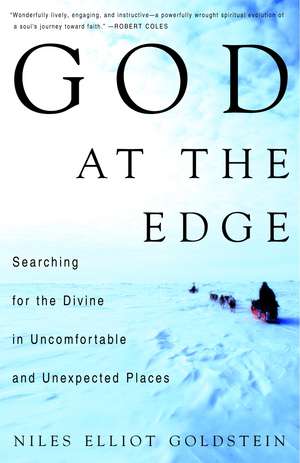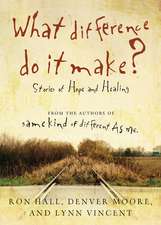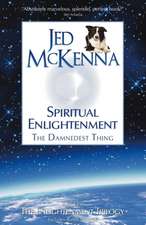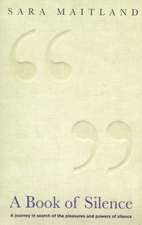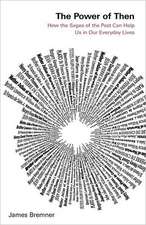God at the Edge: Searching for the Divine in Uncomfortable and Unexpected Places
Autor Niles Elliot Goldsteinen Limba Engleză Paperback – 31 mar 2001
Goldstein is not alone in making this kind of pilgrimage. There has always been a strong tradition of seekers who looked for revelation outside conventional religious settings and encountered God in moments of anguish, terror, and pain. Goldstein juxtaposes his own experiences with those of some of the great historical figures of Judaism and Christianity -- Jonah and St. John of the Cross, Moses Maimonides and Julian of Norwich, Nachman of Bratslav and Martin Luther -- as well as lesser known mystics and preachers, and he discovers, as they did, that it can sometimes take a journey to the edge to recognize God's presence in our lives.
Preț: 89.29 lei
Nou
Puncte Express: 134
Preț estimativ în valută:
17.09€ • 17.73$ • 14.28£
17.09€ • 17.73$ • 14.28£
Carte disponibilă
Livrare economică 25 februarie-11 martie
Preluare comenzi: 021 569.72.76
Specificații
ISBN-13: 9780609804889
ISBN-10: 060980488X
Pagini: 224
Dimensiuni: 216 x 140 x 13 mm
Greutate: 0.3 kg
Editura: Bell Tower Book
ISBN-10: 060980488X
Pagini: 224
Dimensiuni: 216 x 140 x 13 mm
Greutate: 0.3 kg
Editura: Bell Tower Book
Notă biografică
Niles Elliot Goldstein is the founding rabbi of The New Shul in New York City's Greenwich Village. He lectures widely on Jewish mysticism and spirituality and has served on the faculty of New York University and the Hebrew Union College -- Jewish Institute of Religion. Goldstein was the voice behind "Ask the Rabbi" on the Microsoft Network and can now be reached at "Ask Rabbi Goldstein" at www.ifaith.com. He is also the National Jewish Chaplain for the Federal Law Enforcement Officers Association. His essays and poetry have appeared in Newsweek and many other publications, and he is the author or editor of four previous books.
Extras
Much of what passes for spirituality these days is approached from a perspective that is comforting and clean. There are twelve steps for this, seven rules for that, and guardian angels to help us with all of our problems along the way. A great many books on the topic, as well as the motivational speakers who go with them, seem to focus exclusively on the brighter side of spiritual issues, on getting in touch with the serenity, sensitivity, and self-love that are often beyond our grasp. Sometimes these books and individuals go out of their way to accentuate the happier aspects of life, offering uplifting messages of boundless optimism and hope.
While such messages are important and speak to many people, they do not resonate with all of us, nor do they deal adequately with the experiences of struggle and pain. Reality can be messy, and it can frequently force us to reduce our expectations and rein in our hopes. Not everyone can find spiritual fulfillment in a place that feels inviting and safe, like a self-help book or a house of worship. There is a long history of people discovering God in unexpected, unusual, sometimes even uncomfortable contexts. It can occur in a place of darkness, at the edge. Judaism was born in the wilderness of the desert, at the foot of a mountain, as a people cringed in terror. Christianity traces its origins to a man dying on a cross, crying out in doubt and despair.
While American popular culture has generally approached spirituality from a lighter perspective, the world around us has fallen prey to decidedly darker forces. A thousand years ago panic swept over Europe as people thought that the end of history was at hand. Monks stopped copying manuscripts, and construction on new religious buildings came to a halt. Today, as we step into the next millennium, similar apocalyptic impulses have surfaced. We have doomsday cults, survivalist groups, and religious fanaticism. We fear nuclear catastrophe, AIDS, overpopulation, global warming, even alien invasion.
Nietzsche warns us, "If you gaze long into an abyss, the abyss will gaze back into you." But there can be darkness without doom. The edge does not have to lead to nihilism. If we are careful, it is possible to recognize, accept, even grow from spirituality's borderlands without being consumed by them. As a seminarian and now as a young rabbi, I have never been drawn to the religious center, but I am not alone. I am just one link in a very long chain of spiritual malcontents, a chain that extends into our own time. Historically, when the mainstream has been stunted, many have looked to the fringes for their spiritual life.
We have alternative medicine and alternative music. Why not alternative religious expression? In an age when religion has been deconstructed and decentralized, I have started to construct the religious life and lifestyle that I know I will need in order to heed my particular calling: a rabbinate on the edge. In a way, the reshaping of religion in America has opened up new doors for the clergy. Our career paths are no longer spelled out for us in advance. We can work in a variety of noncongregational settings and hold a range of professional positions that those who came before us could never have thought possible. There are hospital pastors, campus ministers, television preachers, and a host of other career options. None of them have appealed to me. So I have tried to go a step further. I have tried to take my faith to the frontier.
In the past, men and women found God -- and their particular spiritual expressions -- in bushes that burned, valleys of shadows, and dens of lions. Some communed with the divine on the peaks of mountains. Others had mystical encounters in prison cells. Itinerant rabbis and explorer priests followed their callings to remote shtetls and uncharted villages. Some found the fullest manifestation of their faith through solitude, hunger, or other forms of denial. Some even found it through death and martyrdom. I understand the impulse toward the edge. My own experience with spirituality has taken place not only in synagogues and through holy books, but in dogsleds, squad cars, and cyberspace. It has taken me to the tundra of Alaska and the steppes of Central Asia. Existential struggle, not equanimity, has been the impetus for my quest, a quest that has uncovered the divine image within me but also brought me face-to-face with my inner darkness and demons.
Authentic works on spirituality have never been afraid to journey to the frontiers of personal experience. Avoiding the darker dimension of the human soul (and its interactions with the world of the spirit) will lead only to scratching the outer crust of our inner worlds. We may feel good as a result. We may think we have found all the answers. But with this approach we will never shake off our false sense of security or encounter the full spectrum of spiritual experiences. This book is about, and for, all those who have struggled to find God in the religious mainstream and have had to look elsewhere. Kierkegaard calls God the Absolute Frontier. It sometimes does take a journey to the edge, into territory that is not always comfortable, to discover the spiritual sustenance we so often crave. The dark forest of the inner spirit may be murky in places, but buried in its soil are the seeds of our salvation.
Then Moses caused Israel to set out from the Sea of Reeds. They went on into the wilderness of Shur; they traveled three days in the wilderness and found no water. They came to Marah, but they could not drink the water of Marah because it was bitter; that is why it was named Marah. And the people grumbled against Moses, saying, "What shall we drink?" So he cried out to the Lord, and the Lord showed him a piece of wood; he threw it into the water and the water became sweet.
-- exodus 15:22-25
While such messages are important and speak to many people, they do not resonate with all of us, nor do they deal adequately with the experiences of struggle and pain. Reality can be messy, and it can frequently force us to reduce our expectations and rein in our hopes. Not everyone can find spiritual fulfillment in a place that feels inviting and safe, like a self-help book or a house of worship. There is a long history of people discovering God in unexpected, unusual, sometimes even uncomfortable contexts. It can occur in a place of darkness, at the edge. Judaism was born in the wilderness of the desert, at the foot of a mountain, as a people cringed in terror. Christianity traces its origins to a man dying on a cross, crying out in doubt and despair.
While American popular culture has generally approached spirituality from a lighter perspective, the world around us has fallen prey to decidedly darker forces. A thousand years ago panic swept over Europe as people thought that the end of history was at hand. Monks stopped copying manuscripts, and construction on new religious buildings came to a halt. Today, as we step into the next millennium, similar apocalyptic impulses have surfaced. We have doomsday cults, survivalist groups, and religious fanaticism. We fear nuclear catastrophe, AIDS, overpopulation, global warming, even alien invasion.
Nietzsche warns us, "If you gaze long into an abyss, the abyss will gaze back into you." But there can be darkness without doom. The edge does not have to lead to nihilism. If we are careful, it is possible to recognize, accept, even grow from spirituality's borderlands without being consumed by them. As a seminarian and now as a young rabbi, I have never been drawn to the religious center, but I am not alone. I am just one link in a very long chain of spiritual malcontents, a chain that extends into our own time. Historically, when the mainstream has been stunted, many have looked to the fringes for their spiritual life.
We have alternative medicine and alternative music. Why not alternative religious expression? In an age when religion has been deconstructed and decentralized, I have started to construct the religious life and lifestyle that I know I will need in order to heed my particular calling: a rabbinate on the edge. In a way, the reshaping of religion in America has opened up new doors for the clergy. Our career paths are no longer spelled out for us in advance. We can work in a variety of noncongregational settings and hold a range of professional positions that those who came before us could never have thought possible. There are hospital pastors, campus ministers, television preachers, and a host of other career options. None of them have appealed to me. So I have tried to go a step further. I have tried to take my faith to the frontier.
In the past, men and women found God -- and their particular spiritual expressions -- in bushes that burned, valleys of shadows, and dens of lions. Some communed with the divine on the peaks of mountains. Others had mystical encounters in prison cells. Itinerant rabbis and explorer priests followed their callings to remote shtetls and uncharted villages. Some found the fullest manifestation of their faith through solitude, hunger, or other forms of denial. Some even found it through death and martyrdom. I understand the impulse toward the edge. My own experience with spirituality has taken place not only in synagogues and through holy books, but in dogsleds, squad cars, and cyberspace. It has taken me to the tundra of Alaska and the steppes of Central Asia. Existential struggle, not equanimity, has been the impetus for my quest, a quest that has uncovered the divine image within me but also brought me face-to-face with my inner darkness and demons.
Authentic works on spirituality have never been afraid to journey to the frontiers of personal experience. Avoiding the darker dimension of the human soul (and its interactions with the world of the spirit) will lead only to scratching the outer crust of our inner worlds. We may feel good as a result. We may think we have found all the answers. But with this approach we will never shake off our false sense of security or encounter the full spectrum of spiritual experiences. This book is about, and for, all those who have struggled to find God in the religious mainstream and have had to look elsewhere. Kierkegaard calls God the Absolute Frontier. It sometimes does take a journey to the edge, into territory that is not always comfortable, to discover the spiritual sustenance we so often crave. The dark forest of the inner spirit may be murky in places, but buried in its soil are the seeds of our salvation.
Then Moses caused Israel to set out from the Sea of Reeds. They went on into the wilderness of Shur; they traveled three days in the wilderness and found no water. They came to Marah, but they could not drink the water of Marah because it was bitter; that is why it was named Marah. And the people grumbled against Moses, saying, "What shall we drink?" So he cried out to the Lord, and the Lord showed him a piece of wood; he threw it into the water and the water became sweet.
-- exodus 15:22-25
Recenzii
"Wonderfully lively, engaging, and instructive -- a powerfully wrought spiritual evolution of a soul's journey toward faith narrated personally and tellingly."
-- Robert Coles, Pulitzer Prize-winner
"With engaging and absolute honesty, Goldstein tells the story of his arduous search for faith and writes with clarity, empathy, and insight about the Christian and Jewish mystics whose quest for enlightenment he himself so movingly emulates. He is a clear-eyed and intelligent seeker who knows that men and women find God in the shadow as often as in the light, in pain as much as in ecstasy."
-- Derek Lundy, author of Godforsaken Sea: Around the Globe Alone Through the World's Most Dangerous Waters
"This is a book for a new generation of seekers, a book that is not afraid to venture into the darker dimensions of the spiritual life. Few today dare to tread where Goldstein has."
-- Rabbi Irving Greenberg, president, Jewish Life Network
"Real life is messy. Most books on spirituality try to clean it up or cover it up. This one is different. Goldstein takes us into the heart of the raw and savage moments of life and provides a much needed balance to the all too often pollyannaish pretensions of contemporary American spirituality."
-- Rabbi Rami M. Shapiro, author of Minyan: Ten Principles for Living a Life of Integrity
"In this spiritual journey, real travels, vividly reported, are paired with lives and thoughts of religious figures, classical and marginal, to provoke the reader to think about what might constitute a vibrant religious life today."
-- Wayne Proudfoot, professor of religion, Columbia University
From the Hardcover edition.
-- Robert Coles, Pulitzer Prize-winner
"With engaging and absolute honesty, Goldstein tells the story of his arduous search for faith and writes with clarity, empathy, and insight about the Christian and Jewish mystics whose quest for enlightenment he himself so movingly emulates. He is a clear-eyed and intelligent seeker who knows that men and women find God in the shadow as often as in the light, in pain as much as in ecstasy."
-- Derek Lundy, author of Godforsaken Sea: Around the Globe Alone Through the World's Most Dangerous Waters
"This is a book for a new generation of seekers, a book that is not afraid to venture into the darker dimensions of the spiritual life. Few today dare to tread where Goldstein has."
-- Rabbi Irving Greenberg, president, Jewish Life Network
"Real life is messy. Most books on spirituality try to clean it up or cover it up. This one is different. Goldstein takes us into the heart of the raw and savage moments of life and provides a much needed balance to the all too often pollyannaish pretensions of contemporary American spirituality."
-- Rabbi Rami M. Shapiro, author of Minyan: Ten Principles for Living a Life of Integrity
"In this spiritual journey, real travels, vividly reported, are paired with lives and thoughts of religious figures, classical and marginal, to provoke the reader to think about what might constitute a vibrant religious life today."
-- Wayne Proudfoot, professor of religion, Columbia University
From the Hardcover edition.
Descriere
Through adventure and raw experience, whether dogsledding above the Arctic Circle or spending the night in a New York jail, Goldstein explores the connections between struggle and growth, fear and transcendence, and uncertainty and his Jewish faith, seeking the boundary where the finite meets the Infinite.
